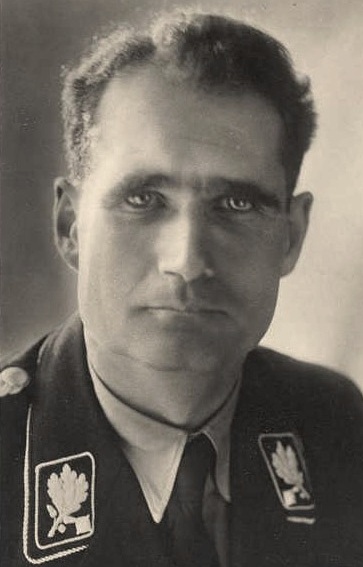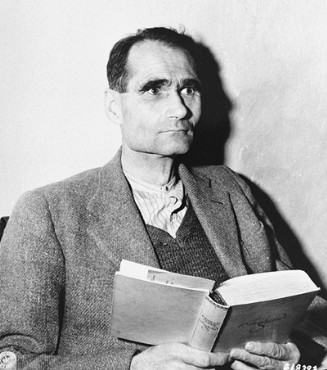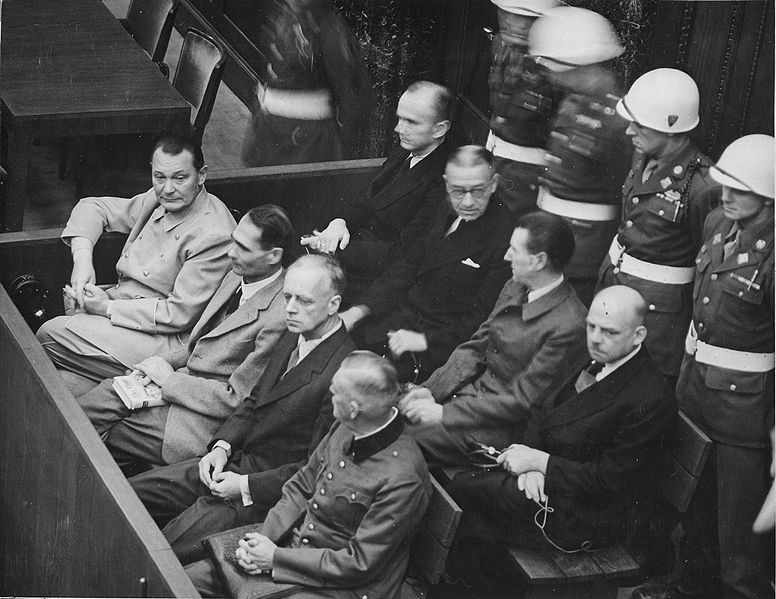<Back to Index>
- Seismologist Charles Francis Richter, 1900
- Playwright William Shakespeare, 1564
- Deputy Führer Rudolf Walter Richard Hess, 1894
PAGE SPONSOR


Rudolf Walter Richard Hess (written Heß in German) (26 April 1894 – 17 August 1987) was a prominent figure in Nazi Germany, acting as Adolf Hitler's Deputy in the Nazi Party. On the eve of war with the Soviet Union, he flew solo to Scotland in an attempt to negotiate peace with the United Kingdom, but instead was arrested. He was tried at Nuremberg and sentenced to life in prison at Spandau Prison, Berlin, where he died in 1987.
Hess'
attempt to negotiate peace and subsequent lifelong imprisonment have
given rise to many theories about his motivation for flying to
Scotland, and conspiracy
theories about why
he remained imprisoned alone at Spandau, long after all other convicts
had been released. On 27 September and 28 September 2007, numerous
British news services published descriptions of conflict between his Western and Soviet captors over his treatment
and how the Soviet captors were steadfast in denying repeated
entreaties for his release on humanitarian grounds during his last
years. Hess has
become a figure of veneration among neo-Nazis. His son Wolf
Rüdiger Hess became
a prominent rightist and claimed that his father was murdered. Hess was
born in Alexandria, Egypt,
the
eldest of four children, to Fritz H. Hess, a German Lutheran importer/exporter from Bavaria and Klara Münch. The
family moved to Germany in 1908, where Rudolf was subsequently enrolled
in boarding school. Although he expressed interest in being an astronomer,
his
father convinced him to study business in Switzerland. At the
outbreak of World
War
I he enlisted
in the 7th Bavarian Field Artillery Regiment, became an infantryman and
was awarded the Iron
Cross, second class. After being wounded on numerous occasions -
including a chest wound severe enough to prevent his return to the
front as an infantryman - he transferred to the Imperial Air Corps
(after being rejected once). He then took aeronautical training and
served in an operational squadron, Jasta 35b (Bavarian), with the rank
of lieutenant from 16 October 1918. He
had no victories. On 20
December 1927 Hess married 27-year-old Ilse Pröhl (22 June 1900 –
7 September 1995) from Hannover.
Together
they had a son, Wolf
Rüdiger
Hess (18
November 1937 – 24 October 2001). After the
war Hess went to Munich and joined the Freikorps and Eiserne
Faust (Iron
Fist). He also joined the Thule
Society, a völkisch occult-mystical organization. Hess enrolled in the University
of
Munich where he
studied political
science, history, economics, and geopolitics under Professor Karl
Haushofer. After hearing Hitler speak in May 1920, he became
completely devoted to him. Ilse Hess’s description of the results of
her husband’s first encounter with Hitler is reminiscent of a religious
conversion. For
commanding an SA battalion during the Beer
Hall
Putsch, Hess served seven-and-a-half months in Landsberg
Prison. Acting as Hitler's private secretary, he transcribed and
partially edited Hitler's book Mein
Kampf. He also
introduced Hitler at party rallies. Eventually, Hess became the
third most powerful man in Germany, behind Hitler and Hermann
Göring. Soon
after Hitler assumed dictatorial powers, Hess was named "Deputy to the
Fuhrer." Hess had a privileged position as Hitler's deputy in the early
years of the Nazi movement and in the early years of the Third Reich.
For instance, he had the power to take "merciless action" against any
defendant who he thought got off too lightly — especially in cases of
those found guilty of attacking the party, Hitler or the state. Hess
also played a prominent part in the creation of the Nuremberg
Laws in 1935.
Hitler biographer John
Toland described
Hess' political insight and abilities as somewhat limited. Hess was
increasingly marginalized throughout the 1930s as foreign policy took
greater prominence. His alienation increased during the early years of
the war, as attention and glory were focused on military leaders, along
with Göring, Joseph
Goebbels and Heinrich
Himmler. Hess worshipped Hitler more than did Göring, Goebbels
and Himmler, but he was not nakedly ambitious and did not crave power in the same manner the others did. However, as the Deputy
Fuhrer, Hess held as much power (If not more than) the other Nazi party leaders
under Hitler. He controlled who could get an audience with the
Fuhrer, as well as passing and vetoing proposed bills, and managing party activities. On the
day Germany invaded Poland and launched World War II, Hitler announced
that should anything happen to both him and Göring, Hess would be
next in the line of succession. Hess
ordered a mapping of all the ley
lines in the Third
Reich. Like Goebbels,
Hess
was privately distressed by the war with the United Kingdom
because he, like almost all other Nazis, hoped that Britain would
accept Germany as an ally. Hess may have hoped to score a diplomatic
victory by sealing a peace between the Third
Reich and Britain, e.g., by implementing the
behind-the-scenes move of the Haushofers in
Nazi
Germany to contact Douglas
Douglas-Hamilton, 14th Duke of Hamilton. On 10 May
1941, at about 6:00 P.M., Hess took off from Augsburg in a Messerschmitt
Bf
110, and Hitler ordered the General
of
the Fighter Arm to
stop Hess (squadron leaders were ordered to scramble only one or two
fighters since Hess' particular aircraft could not be distinguished
from others). Hess parachuted over Renfrewshire,
Scotland,
on 10 May and landed (breaking his ankle) at Floors Farm near Eaglesham. In
a newsreel clip, farmhand David McLean
claims to have arrested Hess with his pitchfork. It
appears that Hess believed the Duke of Hamilton to be an opponent of Winston
Churchill, whom he held responsible for the outbreak of the war.
His proposal of peace included returning all the western European
countries conquered by Germany to their own national governments, but
German police would remain in position. Germany would also pay back the
cost of rebuilding these countries. In return, Britain would have to
support the war against the Soviet
Union. Churchill
sent Hess initially to the Tower
of
London, making Hess the last, in the long line of prominent
political prisoners, to be held in the fortress. The Prime Minister gave
orders that he was to be strictly isolated but treated with dignity. He remained in the Tower
until 20 May 1941. After
being held in the Maryhill army barracks, he was
transferred to Mytchett Place near Aldershot.
The
house was fitted with microphones and sound recording equipment. Frank
Foley and two other
MI6 officers were given the job of debriefing Hess — or "Jonathan", as
he was now known. Churchill's instructions were that Hess should be
strictly isolated, and that every effort should be taken to get any
information out of him that might be useful. British Intelligence
personnel, Ian
Fleming in
particular, proposed that Aleister
Crowley should
question Hess on Nazi interest in the occult. Hess
became increasingly agitated as his conviction grew that he would be murdered.
Mealtimes
were difficult, since Hess suspected that his food might be
poisoned, and the MI6 officers had to exchange their food with his to
reassure him. Gradually, their conviction grew that Hess was insane. Hess was
interviewed by psychiatrist John
Rawlings
Rees who
had worked at the Tavistock
Clinic prior to
becoming a Brigadier in the Army. Rees
concluded that he was not insane, but certainly mentally ill and
suffering from depression — probably due to the
failure of his mission. Hess' diaries from his
imprisonment in Britain after 1941 make many references to visits from
Rees, whom he did not like and accused of poisoning him and "mesmerizing"
him.
Rees took part in the Nuremberg
Trials of 1945. Taken by
surprise, Hitler had Hess' staff arrested. Questioning revealed that
Hess was not motivated by disloyalty, but had simply cracked under the
strain of the war. The official statement from the German government
said that Hess had fallen victim to hallucinations brought on by old
injuries from the previous war. Hitler
also stripped Hess of all of his party and state offices, and privately
ordered him shot on sight if he ever returned to Germany. However, Hitler did grant Hess' wife a pension. Martin
Bormann succeeded
Hess as deputy under a newly-created title. Hess was
detained by the British for the remainder of the war, for most of the
time at Maindiff Court Military Hospital in Abergavenny,
Wales, where he would often be taken to the White Castle on Offa's Dyke
Path. It was rumoured that he was befriended by the local populace. He was also held just
outside Lostwithiel in Cornwall for six months, in a large property
aptly named 'Castle'. He then became a defendant at the Nuremberg
Trials of the
International Military Tribunal, where, in 1946, he was found guilty on
two of four counts: crimes against peace (planning and preparation of
aggressive war) and conspiracy with other German leaders
to commit crimes. He was found not guilty of war
crimes or crimes
against
humanity. He was given a life sentence. Some of
his last words before the tribunal were, "I regret nothing." For
decades he was addressed only as prisoner
number
seven. Throughout the investigations prior to trial Hess
claimed amnesia,
insisting
that he had no memory of his role in the Nazi Party. He went on to
pretend not to recognise even Hermann Göring — who was as
convinced as the psychiatric team that Hess had lost his mind. Hess
then addressed the court, several weeks into hearing evidence, to
announce that his memory had returned — thereby destroying his defence
of diminished responsibility. He later confessed to having enjoyed
pulling the wool over the eyes of the investigative psychiatric team.
Hess was
considered to be the most mentally unstable of all the defendants. He
would be seen talking to himself in court, counting on his fingers,
laughing for no obvious reason. Such behaviour was a source of great
annoyance to Göring, who made clear his desire to be seated apart
from him. The request was denied. Following
the release in 1966 of Baldur
von
Schirach and Albert
Speer, Hess was the sole remaining inmate of Spandau
Prison, partly at the insistence of the Soviets. Guards reportedly
said he degenerated mentally and lost most of his memory. For two
decades, his main companion was warden Eugene
K.
Bird, with whom he formed a close friendship. Bird wrote a 1974
book titled The
Loneliest Man in the World: The Inside Story of the 30-Year
Imprisonment of Rudolf Hess about
his
relationship with Hess. Frank
Keller who was a former guard at Spandau prison said that "Hess would
march by himself in the jail courtyard every day". Keller also said
that Hess would march in the classic Nazi heel-to-toe style. Many
historians and legal commentators have expressed opinions that his long
imprisonment was an injustice. In his book, The Second World War
Part III, Winston
Churchill wrote, The
Hess
flight raised suspicions with Josef Stalin, leader of the USSR, that
secret discussions were under way between Great Britain and Germany to
attack the Soviet Union. Later, in a meeting with Stalin, Churchill
would address the topic and find Stalin still believed secret
agreements were discussed with Hess. "When I make a statement of facts
within my knowledge I expect it to be accepted," Churchill responded to
Stalin, again denying that the incident resulted in any communications
with Nazi Germany. In the
early 1970s, the U.S., British and French
governments had
approached the Soviet government to propose that Hess be released on
humanitarian grounds due to his age. The Soviet official response was
apparently to reject these attempts and reportedly "refused to consider
any reduction in Hess' life sentence." U.S.
President Richard
Nixon was in favour
of releasing Hess and stated that the U.S., Britain and France should
continue to entreat the Soviet Union for his release. In 1977,
Britain's chief prosecutor at Nuremberg, Sir Hartley
Shawcross, characterised Hess' continued imprisonment as a "scandal". In 1987, the new Soviet
leadership agreed that Hess should be set free on humanitarian grounds.
Hess was aware of that decision. On 17
August 1987, Hess died while under Four
Power imprisonment
at Spandau
Prison in West
Berlin, at the age of 93. He was found in a summer house in a
garden located in a secure area of the prison with an electrical cord
wrapped around his neck. His death was ruled a suicide by self-asphyxiation. He
was buried at Wunsiedel in a Hess family grave plot
sold to his family by the Vetters of the Sechsämtertropfen bitter
liquor company of Wunsiedel. Spandau Prison was subsequently demolished
to prevent it from becoming a shrine. After
Hess' death, neo-Nazis from Germany and the rest
of Europe gathered in Wunsiedel for
a memorial march and
similar demonstrations took place every year around the anniversary of
Hess' death. These gatherings were banned from 1991 to 2000 and
neo-Nazis tried to assemble in other cities and countries (such as the
Netherlands and Denmark). Demonstrations in Wunsiedel were again
legalised in 2001. Over 5,000 neo-Nazis marched in 2003, with over
9,000 in 2004, marking some of the biggest Nazi demonstrations in
Germany since 1945. After stricter German legislation regarding
demonstrations by neo-Nazis was enacted in March 2005, the
demonstrations were banned again. At the
time of his death, he was the last surviving member of Hitler's
cabinet.
